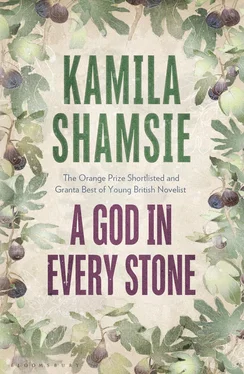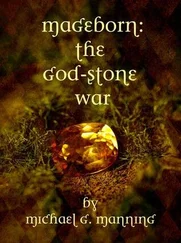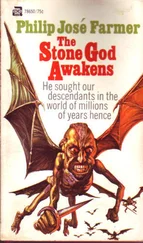Qayyum would have walked all the way to the graveyard beside the donkey-cart — to treat this funeral procession as a cover for escape was an insult — but at a certain point, as they walked past the wheat fields of Shahji-ki-Dheri the dead boy’s father said to him, Go to your brother, and Allah be with you. And all the men said the words which they knew were the last the boy had heard: Inqilaab Zindabad.
He didn’t slow his pace until he reached the Museum grounds, where the gardener took a single look at him and held the garden pipe in his direction. Qayyum cupped his hands, splashed the cool water onto his face and neck, smoothed down his hair. No need to embarrass his brother by running in looking like a crazed Pashtun. He stood up, listened a moment to the birds and touched the bark of a tamarind tree. Every morning he went to the orchards thinking it would be his last day there, but the rent-collector’s sympathies clearly didn’t lie with his King-toasting, polo-playing employer. Or perhaps the men who socialised with Deputy Commissioners and paraded their loyalty by the portraits of kings on the wall were only disguising their deeper sympathies. Peshawar is filled with Scylaxes, he would say to Najeeb, who lived in as close proximity to delight as an adult as he had done as a child.
He thanked the gardener, strode towards the door, and pushed it open. Through the archway leading into the Main Hall he saw two figures; one with her back to him advancing upon the other — an Englishwoman in trousers, her hair short as a boy’s. The Englishwoman turned towards him as he entered and said, Najeeb! her voice containing too much emotion.
— I am his brother, he said, more harshly than he’d intended, and barely had time to be disturbed by her acute look of disappointment before a thought came bearing down on him, trampling all other concerns.
— You haven’t seen him? Yesterday, he didn’t meet you at the train station?
— The train had to turn back. I only arrived in the evening. Someone has gone to fetch him now. No, please don’t go.
The last words were spoken in Pashto to the other woman who, head down, walked past Qayyum — he stepped aside to make room for her — and, ignoring the Englishwoman’s comments, proceeded out of the door.
So now it was the two of them. Qayyum Gul and the famed Miss Spencer.
— I ask for your forgiveness.
She looked over her shoulder and then pointed to herself, a question in the gesture. Qayyum nodded and stepped a few steps closer to her, recalling that Najeeb had once mentioned this high-ceilinged, wooden-floored space used to be a hall where the English came to dance. He hoped her Pashto was fluent so he could say what he needed, quickly, in a language which didn’t make him feel inadequate, and be done with it.
— I came to your house with my brother and stood with my back turned towards you when I should have thanked you for taking the time to teach him.
— So that was you. But it was fifteen years ago.
— That’s fifteen years in which I’ve failed to ask for your forgiveness.
— In all the wide world there is no one like the Pathans!
He had come to hear that idea, from other Indians and from the English, as one indicating the hot-bloodedness of the Pashtuns; but here stood an Englishwoman reflecting his people back at him with warmth and admiration. He saw too keenly what there was in her that Najeeb had found so appealing as a boy, and wheeled away, a lumbering creature who didn’t belong in this place where both women and statues were composed of precise gestures of forgiveness and blessing. But the woman seemed to think he had started a conversation, not concluded one, and came to stand beside him in front of the starving Buddha.
— Are you a letter-writer, like your father?
He looked sideways at her, shook his head, wondering what he was supposed to do now. In Brighton he had grown accustomed to Englishwomen — had come to enjoy their company, if he was honest. But they had all been older, and the relationship of patient and nurse clearly demarcated. What was her name — he tried to remember — that nurse in whose handkerchief he still wrapped his eye at night? How shameful to have forgotten.
Everyone, even Najeeb, assumed Qayyum’s stand against Empire stemmed from Vipers, the suffering he’d been led into for a fight that wasn’t his to fight. But he had never felt closer to the English than on that day. Even now, he knew hatred could never truly take root in his breast so long as he remembered Captain Dalmohy shot again and again, getting back to his feet each time as though his body were an irrelevance; and Captain Christopher, dying with Urdu words of gratitude on his lips for the sepoys who had rushed to help him. It was later, at Brighton, that the questions began. It was because of the nurses. His glass eye felt gritty in its socket. Tell them a widow gave a present to a Pathan boy — let the Empire tremble at that! It was something like that she’d said, and he’d been astonished by her audacity, the dismissal of Empire. Everything had started there.
But the only young Englishwoman he’d ever spoken to was that one — how vividly the memory came back — on the train to Peshawar. He was thinking this as the Englishwoman beside him held out a cigarette case to him and offered him its contents, her hand freckled.
— Turkish. The cigarettes are Turkish.
She smiled as if this observation of his, in English, were something wonderful, showing uneven teeth, pink gums. Now he started to think he had recognised her immediately. The large blue eyes, the angular features. But no, he hadn’t. When he thought of her — and sometimes he did — what he recalled was not eyes or jawline but the impatience of her gestures, the hunger of a woman trying to be a man and failing as a result to be either man or woman. But now everything about her was more measured.
— How did you first meet my brother?
— He was my welcome committee in Peshawar the first time I arrived here. Well, not really. But when I stepped off the train, there he was.
— You were right.
— I’m sorry?
— That day, when I told you I was twenty-one years old, you said this is just the beginning. You were right.
Her look of confusion disappeared the moment he pointed to his glass eye, and then her hand covered her mouth and the two of them stood and looked at each other, directly now in a way that hadn’t been possible until this moment, excavating their memories for what remained there of the train journey, one speaking in Pashto, one in English.
— You sketched all the way from the Indus to Peshawar.
— I barged into your compartment!
— You offered me half your bread roll.
— You refused that, but you took the cigarette later.
And then they both said, Turkish! and laughed, as if something miraculous had happened. Qayyum thought, wait until I tell Najeeb.
— Where is he, that brother of mine? In the house with his broken statues?
— He has broken statues at home?
— At home. No. What do you mean, at home?
— Someone went to get him from his house. They say, because of all this trouble, he probably decided to stay in the Walled City. Oh, there’s the fellow who went to get him.
Qayyum turned round, trying to fight the rising, ridiculous panic. The peon at the Museum was shaking his head at the Englishwoman, saying, The soldiers won’t allow me into the Walled City.
— But he’s here, Qayyum said, walking across to the peon, catching hold of his arm. He was here yesterday. He stayed in the Cantonment overnight.
The peon shook his head.
— No, he said, he didn’t come in yesterday at all.
Qayyum pushed the peon aside and strode out of the door. He was here yesterday, Najeeb Gul, my brother, he was here. And the gardener: no, not yesterday. He never came. Qayyum put a hand out, felt rough bark beneath his skin. The Englishwoman had followed him out. Mr Gul? she said, and her voice was shrill, awful. He gritted his teeth against the sound, and ran out of the grounds towards the Walled City.
Читать дальше












